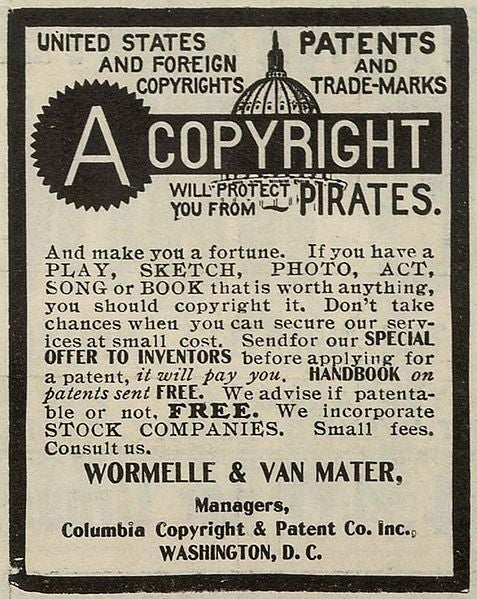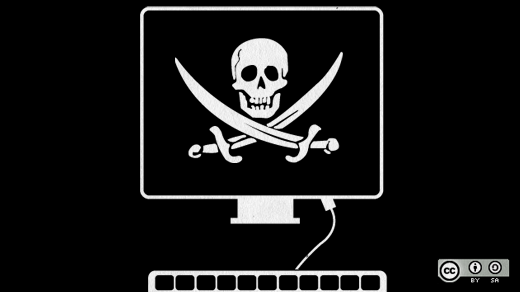To celebrate Talk Like a Pirate Day the opensource.com way, we gathered a list of things that have been said through the history of copyright, copying, remixing, and the sort of piracy that doesn't involve tricorn hats or cutlasses.
"Music and gymnastic (must) be preserved in their original form, and no innovation made. They must do their utmost to maintain them intact. [...]
for any musical innovation is full of danger in the whole State,
and ought to be prohibited.
- Plato, The Republic, 380 BC
"It is not right that the divine words in that book should perish, or that I or any other should be hindered from writing them or reading them or spreading them among the tribes."
"To every cow belongs its calf; to every book its copy."
- King Diarmait, ruling against St. Columba
"Printers everywhere in America followed [Benjamin Franklin's] lead. There are notorious examples of pirating. Matthew Carey, an important American publisher, paid a London agent--a sort of literary spy--to send copies of unbound pages, or even proofs, to him in fast ships that could sail to America in a month. Carey's men would sail out to meet the incoming ships in the harbor and speed the pirated books into print using typesetters who divided the book into sections and worked in shifts around the clock. Such a pirated English book could be reprinted in a day and placed on the shelves for sale in American bookstores almost as fast as in England."
- Outline of American Literature, 2006, describing the rampant print piracy in 18th century America
"[Charles Dickens] bewailed, ironically, "the exquisite justice of never deriving sixpence from an enormous American sale of all my books." Having already spoken up for increased copyright protection in Britain and for a British-American agreement, he had it in mind to advance a just cause from which he and others would benefit. Ignorant of the complications of copyright politics and of the recent severe depression, he crossed the Atlantic with the naïve expectation that in this republic of his imagination elemental notions of fairness would triumph over politics and power relationships, as if America were some elegant utopia."
- Fred Kaplan, Dickens, A Biography, 1988
"Pirated works may be seized on importation into those countries of the Union where the original work enjoys legal protection."
- Article 12 of the 1886 Berne Convention for the Protection of Literary and Artistic Works

Copyright advertisement from the New York Clipper, 1906
"I say to you that the VCR is to the American film producer and the American public as the Boston strangler is to the woman home alone."
- Jack Valenti, MPAA president in congressional testimony, 1982
"Time-shifting merely enables a viewer to see such a work which he had been invited to witness in its entirety free of charge. [...]
One may search the Copyright Act in vain for any sign that the elected representatives of the millions of people who watch television every day have made it unlawful to copy a program for later viewing at home, or have enacted a flat prohibition against the sale of machines that make such copying possible. [...]
It is not our job to apply laws that have not been written.
- Supreme Court Justice John Paul Stevens, Sony v. Universal City Studios, 1984
The phonorecords in question were not "stolen, converted or taken by fraud" for purposes of [section] 2314. The section's language clearly contemplates a physical identity between the items unlawfully obtained and those eventually transported, and hence some prior physical taking of the subject goods. [...] The infringer of a copyright does not assume physical control over the copyright nor wholly deprive its owner of its use. Infringement implicates a more complex set of property interests than does run-of-the-mill theft, conversion, or fraud.
- Reporter of Decisions of the Supreme Court, Dowling v. United States, 1985
In 2002, the RIAA reported that CD sales had fallen by 8.9 percent, from 882 million to 803 million units; revenues fell 6.7 percent. This confirms a trend over the past few years. The RIAA blames Internet piracy for the trend, though there are many other causes that could account for this drop. SoundScan, for example, reports a more than 20 percent drop in the number of CDs released since 1999. That no doubt accounts for some of the decrease in sales... But let’s assume the RIAA is right, and all of the decline in CD sales is because of Internet sharing. Here’s the rub: In the same period that the RIAA estimates that 803 million CDs were sold, the RIAA estimates that 2.1 billion CDs were downloaded for free. Thus, although 2.6 times the total number of CDs sold were downloaded for free, sales revenue fell by just 6.7 percent... [So] there is a huge difference between downloading a song and stealing a CD.
- Lawrence Lessig, Free Culture: How Big Media Uses Technology and the Law to Lock Down Culture and Control Creativity, 2004
"So we understand piracy now as a business model. It exists to serve a need in the marketplace specifically for consumers who want TV content on demand and it competes for consumers the same way we do, through high-quality, price and availability and we don't like the model. But we realize it's effective enough to make piracy a key competitor going forward. And we've created a strategy to address this threat with attractive, easy to use ways to for viewers to get the content they want from us legally; in other words, keeping honest people honest."
- Anne Sweeney, president of Disney-ABC Television Group, 2006
"No pasa nada, podéis bajar lo que queráis del eMule. Pero no lo vendáis."
- Jorge Martín, Jefe del Grupo de Seguridad Lógica de la Brigada de Investigación Tecnológica en la Comisaría General de Policía Judicial, 2007
Roughly, "It doesn't matter; download anything you want from eMule. But don't sell it," said by the head of the technology arm of the police in Spain, where courts have ruled that file sharing for private use is legal.
"The RIAA’s lawsuit campaign against individual American music fans has failed. It has failed to curtail P2P downloading. It has not persuaded music fans that sharing is equivalent to shoplifting. It has not put a penny into the pockets of artists. It has done little to drive most filesharers into the arms of authorized music services. In fact, the RIAA lawsuits may well be driving filesharers to new technologies that will be much harder for the RIAA’s investigators to infiltrate and monitor."
- Electronic Frontier Foundation, RIAA v. The People, Five Years Later, 2008
“Global digital music sales grow as music industry develops new business models
- Music companies embrace new revenue models, offering consumers more choice
- 95 per cent of music downloads are unauthorised, with no payment to artists and producers"
- International Federation of the Phonographic Industry, Digital Music Report 2009
“P2P networks are mere conduits for the transmission of data between Internet users, and on this basis they do not infringe rights protected by Intellectual Property laws."
- Spanish judge, ruling that file sharing copyrighted works is legal there, 2010
"The copyright wars aren't new of course. I say every pirate wants to be an admiral."
- Cory Doctorow, video interview, 2011







2 Comments